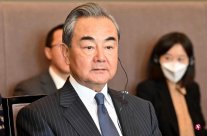With the hope of overseas investors' re -opening up of the Chinese economy, it has gradually transformed into concerns about the decline in the amount of transportation of Chinese goods and the downturn of houses and automotive markets. Overseas investors have reduced the purchase of Chinese stocks.
According to the Nikkei Asia Monday (February 20), within the three months as of the end of January, the widely tracked CSI 300 stock index jumped 18.47%, but in February, it has so far.The decline of 2.94%, and foreign investors also slowed down significantly through the Shanghai -Hong Kong Stock Connect trading links.
According to the financial data published by the data provider Wind, since February, foreign investors have purchased 16.6 billion yuan (RMB, the same below, about S $ 3.233 billion) through the Shanghai -Hong Kong Stock Connect.Stocks, this has fallen sharply compared with the 159.1 billion yuan in the same period in January and the full monthly record of 141.2 billion yuan.In the 13 trading days in February, there were six days to record foreign investment as net negative value, and only one day in January was a net outflow.
Carlos Casanova, a Swiss Private Bank of Switzerland, believes that the initial investment fanatics after the above data showed that the above data showed that the initial investment fanatic after unblocking had passed.
It is reported that the CSI 300 index rebounded strongly from the 3508.7 at the end of October 2022, and it was more on the cancellation of the "clear zero" strict epidemic prevention and control policy on December 7th.of.
However, even during this period, many foreign investors' willingness to invest is not so high.Citi Investment Research Chief Global stock strategist Robert Buckland said at a online discussion in Singapore in January this year that the Chinese market may shift from "completely non -investment" to "problem asset level".
Similar concerns have also deepened recently due to a series of factors, including sales data of the real estate market, ports, and electric vehicle manufacturers, the United States increased interest rates, and the United States shot down the Chinese high -altitude reconnaissance gas balloon.The geopolitical tension upgrade caused by later.
Reports pointed out that the development of Chinese state -owned housing enterprises and China Resources Land only recorded 4%annual revenue in January this year; most private developers also recorded a double -digit decline during this period, of which ShanghaiXuhui Holdings' sales plummeted 41%, Shanghai's Zhongjun Group Holdings fell 39%, and Guangzhou R & F Real Estate plummeted 71%.
On the other hand, after the Chinese government gradually stopped rewarding the purchase of electric vehicles and traditional oil vehicles, Chinese car sales were also severely damaged in January this year.In January of this year, BYD was the only listed company that noted sales year by year. The overall decline in the overall and electric vehicle sales of SAIC Group, GAC Group, Dongfeng Automobile, Great Wall Motors and Geely Automobile has fallen.
China ’s cancellation of epidemic prevention and control has driven the public to travel, but the Chinese cargo transportation market is still weak.China Merchants Port's domestic port cargo throughput increased by 31%over the same period last year, but the COSCO Shipping Port fell 12%, while Guangzhou Port and Ningbo Zhoushan Port fell by 10%and 3%, respectively.
The Swiss Private Bank of Ruilian (UBP) senior Asian economist Charles Casanova predicts that foreign investors may wait and see until Beijing formulated the goal of economic growth in March this year.Although he will be optimistic about China's GDP growth will be promoted by consumption improvement, it also warns that there will be a large market turmoil in China from March to April this year, as the company will report the revenue of the fourth quarter affected by the epidemic control.



